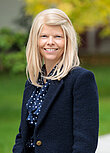The board of directors consists of five members and acts as the executive committee of the Young Academy. The members, who are elected annually, also function as delegates in the General Assembly of the Austrian Academy of Sciences. In addition to the board of directors, the Young Academy sends eleven more delegates and eight deputies to the General Assembly.
MEMBERS OF THE BOARD OF DIRECTORS

Christoph Bock
Research Area: Bioinformatics
CeMM - Research Center for Molecular Medicine of the Austrian Academy of Sciences



Nina Mirnig
Research Area: Indology
The Institute for the Cultural and Intellectual History of Asia of the Austrian Academy of Sciences

Austrian Academy of Sciences (OeAW)
Actuary (Young Academy)
Dr. Ignaz Seipel-Platz 2
1010 Vienna
T +43 1 51581-1294
junge.akademie(at)oeaw.ac.at